- Home
- J. T. Edson
The Ysabel Kid
The Ysabel Kid Read online
THE YSABEL KID
THE FLOATING OUTFIT
By J. T. Edson
First published by Brown Watson Ltd in 1962
Copyright © 1962, 2014 by J. T. Edson
Published by Piccadilly Publishing at Smashwords: February 2015
Names, characters and incidents in this book are fictional, and any resemblance to actual events, locales, organizations, or persons living or dead is purely coincidental.
This ebook is licensed for your personal enjoyment only. This ebook may not be re-sold or given away to other people. If you would like to share this book with another person, please purchase an additional copy for each reader.
Cover image © 2015 by Edward Martin
This is a Piccadilly Publishing Book ~ Series Editor: Ben Bridges
Text © Piccadilly Publishing
Published by Arrangement with the Author’s Agent.
His father was Sam Ysabel, a wild Irish Kentuckian who’d come to Texas in the early days and rode as scout to Jim Bowie. His mother was the daughter of Chief Longwalker and his French Creole squaw. That dangerous mixture of bloods produced a son who inherited the sighting eye of an eagle from the sure-shooting, rifle-toting Kentuckian stock. From the French Creole side he got a love of cold steel and the inborn knack of handling a knife. And from his Comanche grandfather he got his horse savvy and ability to read sign where a buck Apache might falter.
His full name was Loncey Dalton Ysabel. Most men knew him as … the Ysabel Kid.
The war was over. The South had lost. But the Texas rebels of the Floating Outfit were too busy to surrender. They must go down into Mexico to convince Bushrod Sheldon to come back to Texas so the US can aid Juarez. They had to smuggle a thousand Henry repeaters across the border to Juarez--and to do it they needed the help of the bad-hat, war-wise kid named the Ysabel Kid.
To Linda Hyde,
my favorite librarian
Chapter One – Bring Back Bushrod Sheldon!
“Bring back Bushrod Sheldon!”
That was the order President U.S. Grant gave so lightly, back in Washington. It was however an order that would not be so easy to carry out, and that General Philo Handiman knew in every campaign-toughened inch of his body.
The Civil War was over and had been for a year or more now. With peace the Government in Washington was turning its attention to the problem of Mexico where the French usurper, Maximilian, ruled the country with the bayonets and sabers of his troops and Benito Juarez fought back with the savagery of one possessed.
The United States gave long consideration to the matter for they did not want a European controlled country on each flank of their young and fast growing nation. The decision to lend help to Juarez came after long argument. Canada was firm under the distant Grandmother so the United States looked south. There was a large, well-armed, equipped and battle wise Army ready to move.
Then someone remembered old Bushrod Sheldon.
Sheldon was a hardheaded, hard-fighting Southern gentleman who refused calmly to accept Robert E. Lee’s decision to end the useless killing. Disdaining to surrender he went south to join Maximilian and fight Juarez.
Now one cantankerous old Dixie soldier would hardly have made such a great difference to the plans of a nation, but when he went two hundred and fifty fire-eating warriors as tough and battle wise as any the Union Army could show went with him.
Even so they would merely have been a drop in the ocean compared with the number of men the United States was prepared to release from Indian fighting and garrison duties. In numbers that is. General Handiman, head of the newly formed Secret Service, got word through his agents in the South that if Sheldon were attacked by Union troops every half-reconstructed Rebel would dig up the Appomattox-buried hatchet and paint once more for war.
This provoked serious discussion in the Capital, and there were varied views on what would be the best course to follow. The “Boy General”, now no more than a very junior Lieutenant Colonel, George Armstrong Custer was one who raised his voice for open war and to hell with the consequences. However, war was his kind’s only answer to every problem.
Saner heads, reviewing the casualty list in the Union Army caused by fighting those hardy sons of the South, agreed that Sheldon must be brought back. Even if it meant offering some fair-sized concessions to get him to return. The only serious problem after making the decision was whether the old-timer would come back. One thing was for sure. Bushrod Sheldon would never return on the word of a Yankee.
Finally, after much long thought President Grant dropped the handling of the affair into General Handiman’s lap and let it lie there. Handiman knew that there was one man who might get Bushrod Sheldon to return. But would that man help?
Handiman eased himself in the uncomfortable seat of the Army buggy and let his aide get on with the driving without any comment or conversation. In fact Handiman hadn’t done much talking since they left Washington headed for the cattle country of South West Texas, headed to visit the man Handiman thought might be able to talk sense to Bushrod Sheldon.
Ole Devil Hardin was just as tough, hard and irascible and as loyal to the stars and bars of Dixie as Sheldon and could talk as an old and trusted friend to the other man. If Hardin would help that is.
In the days before the war Handiman had been a friend and welcome to the great OD Connected ranch but Ole Devil Hardin wore Confederate grey in the War and led the Texas Light Cavalry Brigade. It all hinged on his decision to forget the War and go down there into trouble-torn Mexico to take Grant’s letter and his own sage advice to Sheldon.
Handiman remembered how after the Appomattox Ole Devil Hardin turned his Brigade back to Texas and disbanded those hardy, battle wise young veterans and left word that as far as the Rio Hondo country was concerned reconstruction was out and no Yankee need show his face there. It said much for the esteem the Texas Light Cavalry’s commander was held in for no Union soldiers had been near his area since the War.
Lieutenant Collings, Handiman’s aide, had not held his post for six months without learning when he could be expected to make polite conversation and when to keep his mouth clamped tight shut. This was one of the latter times, the General was worried and deep in thought; he wouldn’t take it kindly having his thoughts interrupted. So Collings was free to relax and let the two-horse team follow the rough wagon trail with a minimum of bother. He was free to look around the miles of rolling Texas range country, grazing lands of the OD Connected and the Barbed B ranches. Looking up a slope he saw something which made him break the silence and risk Handiman’s anger.
“How far are we from the ranch, sir?” he asked.
“About five miles,” Handiman replied, pleased that the young man had broken the silence and his worries could be forgotten for a time.
“Then there will be no danger from those Indians?”
“Indians?” Handiman was hardly concentrating at the moment. “Which Indians?”
“Up there on the rim!”
Handiman twisted round and squinted his eyes as he looked up the slope. He saw which Indians were meant. They sat there lining the top of a rim overlooking the trail. Twenty squat built, savage faced young braves, naked to the waist and every one of them holding a lance. This apart from the knives or tomahawks at their belts were their only weapons.
Studying the Indians Handiman realized they were the first hostiles he’d seen in many years. In fact, he’d not fought Indians since back in forty-seven when Sam Colt’s first model Dragoon revolver was being debated as a newfangled contraption which would ruin the conception of the mounted soldier. What this amounted to was that man did not know much about Indians in general and Comanches in particular.
With more knowledge he’d have been far more wor
ried than he was now. Ordinary Comanches were bad enough, these were not ordinary Comanches. They were of the Dog Soldier Lodge. Twenty of those bad hat, war wise young warriors were more than a match for an equal number of Indian fighting trained soldiers. No two officers, fresh shone bright and out of Washington, would stand a chance of survival against them.
“Move that team!” Handiman barked. “We’ll have to run for it.”
The aide swung his whip to crack it in the air, that was all the two horses needed to know. They lunged forward into the traces hard enough to lift the buggy clear off the ground. When it lit down again the wheels were spinning fast and the team running.
That was where Handiman made his first mistake. The Comanches were here on a scouting mission and not after war, yet like animals they bore the instinct to pursue anything which ran from them. This was too good a chance to miss. A pair of bluecoat soldiers alone and unescorted would be easy meat and would provide trophies to take back to the lodges of the tribe. With the thought of this and showing the superb horsemanship which made them the equal of any light cavalry in the world the Comanches sent their horses in a rump scraping slide down the slope headed for the trail.
“No bows or rifles,” Handiman growled to his aide. “That’s luck.”
It wasn’t the kind of luck a man knowledgeable in Indian ways would have wanted. Those lances told a grim and dangerous story. It meant the Comanches were under lodge oath to count coup with the lance and would press an attack even after their brothers armed with bow and rifle were all done and headed for home.
The braves hit the trail about thirty yards behind the buggy and hurled their wiry war ponies after it. Handiman watched them and then pulled out his Colt 1860 Army revolver, easing back the hammer. He held his fire, waiting for a better chance than was yet made for it took time to remove the spent caps from the nipples and recharge each separate chamber with powder and ball. There was no time to spare.
Handiman lined his gun and fired at the nearest brave. Even at that range the bullet must have come close for the young man ducked in an involuntary move which brought derisive cheers from his friends. He straightened and howled out his kill or die shout, then sent his horse forward even faster.
In his time at the Point, Collings had been known as one of the finest racing buggy drivers. His team today were as good as could be selected by a Major with an eye on promotion and desire to please the General, but harnessed horse was never sired that could pull a buggy and outrun Comanche war-ponies urged on by name-making braves after white-eye scalps. The team tried its best but those screaming young warriors drew nearer with every raking, ground-covering stride.
Carefully, Handiman fired two more shots, but neither took effect, his fourth shot sent a wild-eyed brave rolling in the churned up dust but the others kept right straight on. This was a disappointment to the General for he’d hoped that losing a man would turn the others off. He didn’t know Dog Soldiers, they could count well and knew just how many bullets a revolver carried, so were waiting for two more to be fired. In the rocking buggy Handiman reached over and removed his aide’s Colt, knowing that the young man could not handle reins and gun. He felt slightly better with a gun in each hand for he could now turn loose eight chunks of lead and he hoped to make some of it count.
Behind, the Comanches sent their racing ponies surging forward, not following any set plan of attack but all racing to be the first to count coup. This was their usual method of fighting and gave Handiman some slight advantage for the young braves got in each other’s way. Then one lunged forward, ahead of the other wild riders. The Colt lined on him but just as Handiman fired the brave slipped over one flank and hung there causing the bullet to miss him and knock a man behind from his racing pony.
The other braves were closing in now and regretfully Handiman shot the nearest horse from under him. The brave lit down running and as a riderless pony went by in the wake of the others caught it by the mane and vaulted aboard.
It was the aide who first saw dust rising ahead of them, he yelled and tried to attract Handiman’s attention to it. The General only managed to give one quick glance, then turned his attention back to the Indians behind. The dust ahead must mean the Comanches had friends there and it looked as if Handiman’s task was coming to an abrupt end.
Up on the rim the dust cloud rolled, hard riding shapes now showing in it. A yell shattered the air and Handiman heard it with relief though he’d never thought to be pleased to hear that sound. It was the wild ringing Rebel battle cry he’d heard at Shiloh, Bull Run, Antietam; heard it and cursed it. Now it was the sweetest and most pleasant sound in the world.
Eight hard riding men came tearing down the slope, riding with the same skill as the Comanches showed earlier. The man in the center of the group gave a shouted order and the eight cowhands fanned out like a well-trained cavalry. This was not in itself surprising for the Rio Hondo had stripped its lands of young men to fight in the Texas Light Cavalry Brigade.
Collings’ attention was taken from the sight of those men by the sight of a Comanche brave, lance lowered to kill the offside horse, riding alongside. Lashing out with the buggy whip Collings felt it bite into the brown skin and the brave jerked his horse out of range. But the others were crowding in, all wanting to get to the buggy and count coup before the guns of the cowhands drove them off.
The cowhands were coming in fast, their leader barked another order and their revolvers came clear but he did not take his white-handled Colt 1860 Army guns from their butt forward holsters. He sat that huge paint stallion like a centaur and watched with calculating eyes the distance closing. Then his hands crossed and the sun reflected dully on the blued frames of the guns as they came out.
Handiman was in bad trouble. Two braves were close in to the wagon, one at either side. The General knew that he could only get one of the two. If he killed the man lining on him the young Lieutenant would die. If he killed the other, the man nearest him would send the lance crashing into him. Ahead on the trail the cowhands were bringing their horses into line and charging on though they were all holding their fire. Handiman did not see them; he made his decision. Collings was a young man and a useful officer. With this in mind Handiman brought his gun round to save the young officer’s life. Then he heard what he thought was one shot and the man on his right went down over the back of his horse while the other at the left swayed over with lead in him.
Smoke curled up from the matched guns in the hands of the leader of the cowhands. He’d fired both so near together that the two shots sounded as one. Then in echo of his shots the other men fired as smooth a volley as it had ever been General Handiman’s pleasure to hear. The Comanches rocked back visibly under that volley, three went down but the rest pressed home their attack on both buggy and cowhands.
Dust clouds whirled round and through the dust Handiman got brief glimpses of the wild battle around him. He saw a wild-eyed brown face looming up and sent a bullet into it. Then for a brief instant the cowhand on the paint came into view, he seemed to have eyes which saw all round him and guns that lined themselves.
Then it was over, the Comanches whirled their horses, the ten who were left, and raced off fast. Even traveling as they did only one body was left behind by the fleeing braves, the rest had been scooped up and carried off.
The dust cloud rolled away and the grinning cowhands sat their horses around the buggy. One of their number was dabbing a lance slash on his leg and the rest of them crowded round making ribald comments about him.
“Get after them!” Collings yelled angrily. “Chase them—”
“Sure thing, soldier boy,” a lean grinning cowhand agreed.
“Like hell,” the man on the big paint stallion replied softly as the other riders started to turn their horses. “You bunch have work to do. You’re not Army, getting paid to fight Indians.”
“They warn’t fighting Indians, Cap’n,” the hand objected. “Were running away from them, way I saw it.”
> Collings snorted angrily; he was used to civilians treating him with some respect. He pointed after the fast disappearing braves and snapped: “Why don’t you allow the men to follow them. Find out where they’re going and teach them a further sharp lesson.”
“Mister,” the small man on the paint looked Collings over with a cold, icy disgust the Lieutenant hadn’t seen since his first year as a plebe at West Point, the look a senior cadet gave to a junior who made silly suggestions. “When a Comanche Dog Soldier lights out like that not even a Texan can catch up with them. Likewise we know where they’re going. If we try to inflict further lessons on them, where they’re going they’ve got friends who’ll inflict it right back again.”
Handiman studied the small man who appeared to be in command of the riders. That other hand had called him “Cap’n,” it must be either a nickname or used in a mocking sense. If he was giving orders it meant he was in all probability one of Ole Devil’s kin. That would explain why they took his orders. There could be no other reason why grown men would obey so insignificant a youngster.
He wasn’t a tall man, this leader. Nor could he show such a commanding figure as the tall, heavily built General. His black J.B. Stetson hat was thrust back to show his curly, dusty blond hair. His face was handsome enough, a young face with grey eyes which looked hard at a man and met the gaze without flinching. Around his throat was a tight rolled bandana of red silk, the ends hanging long over his dark red shirt. The jean overalls were faded and the cuffs turned back, hanging loose over his expensive, fancy decorated boots. Around his waist was a hand-tooled gunbelt with a Confederate Army buckle and in the holsters of the belt were the matched brace of bone-handled Colt revolvers he’d used so well; they looked out of place on so young a frame, for the rider did not look older than sixteen or so. That paint stallion, too, was as fine an animal as it had been Handiman’s pleasure to look on. Yet the small young man did not look as if he should own or be riding so fine a creature.

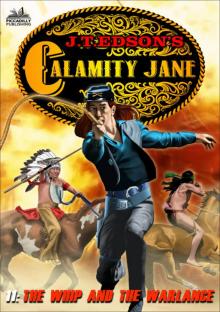 Calamity Jane 11
Calamity Jane 11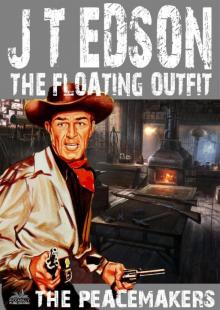 The Floating Outift 33
The Floating Outift 33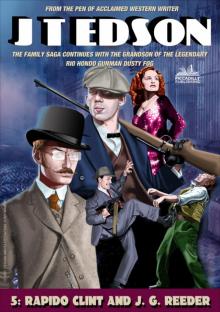 Cap Fog 5
Cap Fog 5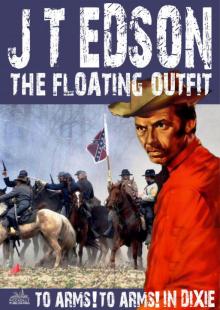 The Floating Outfit 34
The Floating Outfit 34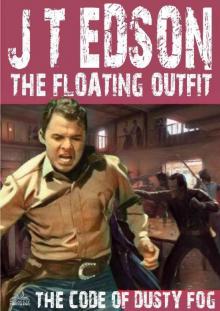 The Code of Dusty Fog
The Code of Dusty Fog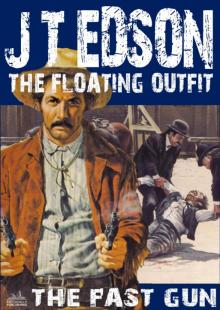 The Floating Outfit 21
The Floating Outfit 21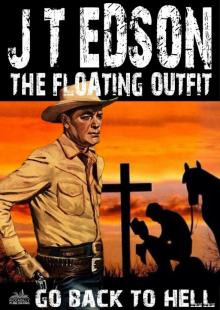 The Floating Outift 36
The Floating Outift 36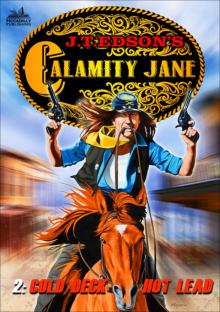 Calamity Jane 2
Calamity Jane 2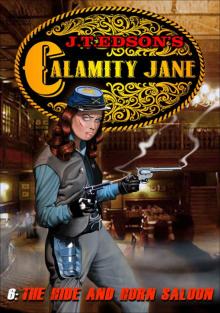 Calamity Jane 6: The Hide and Horn Saloon (A Calamity Jane Western)
Calamity Jane 6: The Hide and Horn Saloon (A Calamity Jane Western)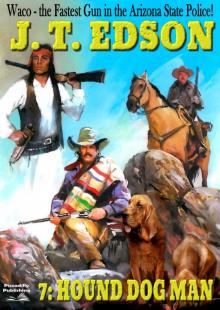 Waco 7
Waco 7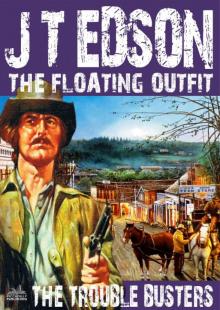 The Floating Outfit 25
The Floating Outfit 25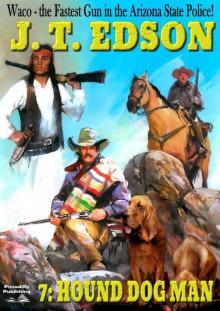 Waco 7: Hound Dog Man (A Waco Western)
Waco 7: Hound Dog Man (A Waco Western)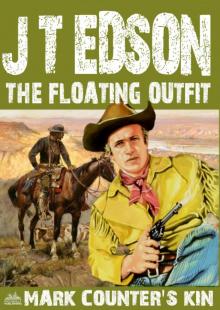 The Floating Outfit 47
The Floating Outfit 47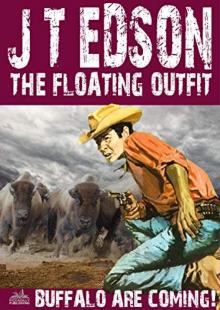 The Floating Outfit 42: Buffalo Are Coming!
The Floating Outfit 42: Buffalo Are Coming!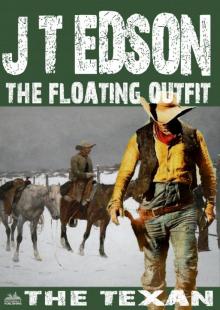 The Floating Outfit 46
The Floating Outfit 46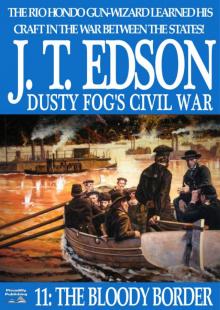 Dusty Fog's Civil War 11
Dusty Fog's Civil War 11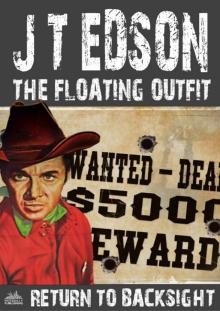 The Floating Outfit 61
The Floating Outfit 61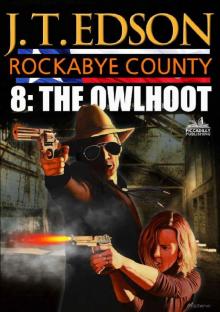 The Owlhoot
The Owlhoot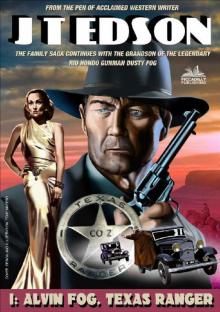 Alvin Fog, Texas Ranger
Alvin Fog, Texas Ranger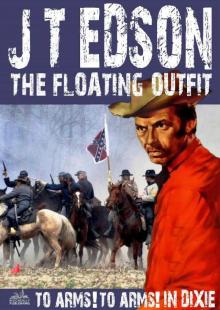 The Floating Outfit 34: To Arms! To Arms! In Dixie! (A Floating Outfit Western)
The Floating Outfit 34: To Arms! To Arms! In Dixie! (A Floating Outfit Western)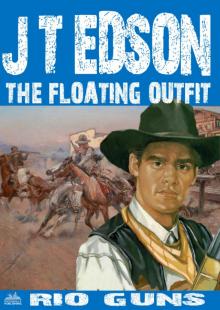 The Floating Outfit 44
The Floating Outfit 44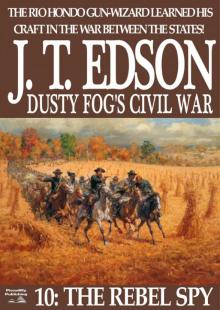 Dusty Fog's Civil War 10
Dusty Fog's Civil War 10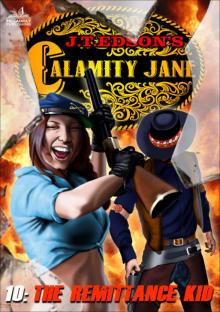 Calamity Jane 10
Calamity Jane 10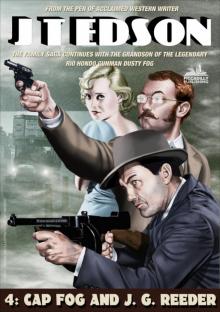 Cap Fog 4
Cap Fog 4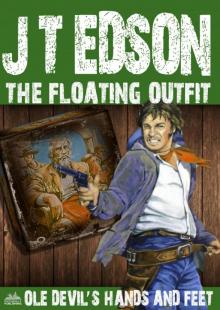 The Floating Outfit 51
The Floating Outfit 51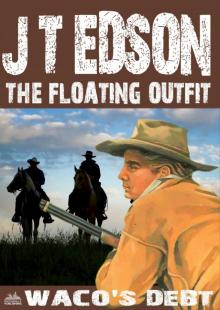 The Floating Outfit 50
The Floating Outfit 50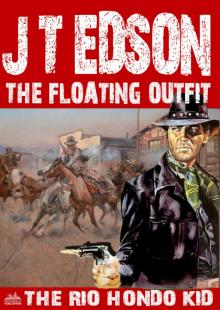 The Floating Outfit 49
The Floating Outfit 49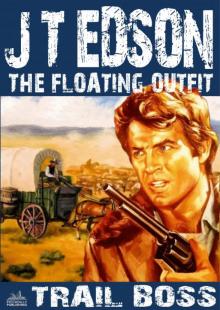 The Floating Outfit 10
The Floating Outfit 10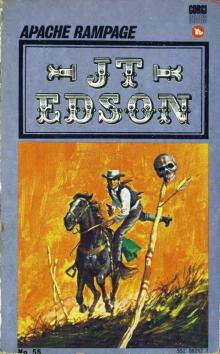 Apache Rampage
Apache Rampage The Floating Outfit 15
The Floating Outfit 15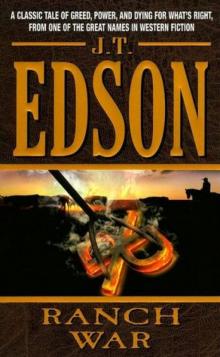 Ranch War
Ranch War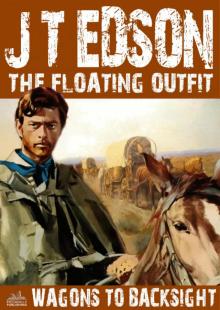 The Floating Outfit 11
The Floating Outfit 11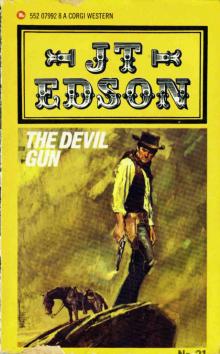 The Devil Gun
The Devil Gun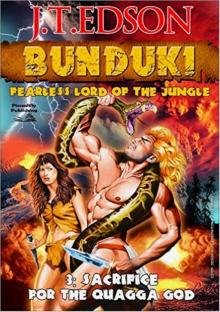 Sacrifice for the Quagga God (A Bunduki Jungle Adventure Book 3)
Sacrifice for the Quagga God (A Bunduki Jungle Adventure Book 3)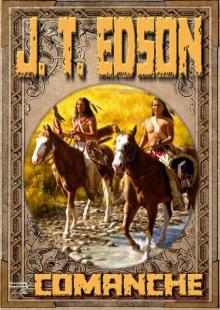 Comanche (A J.T. Edson Western Book 1)
Comanche (A J.T. Edson Western Book 1)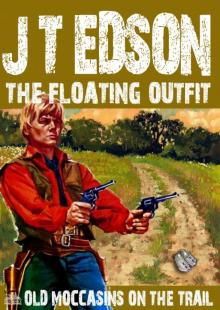 The Floating Outfit 48
The Floating Outfit 48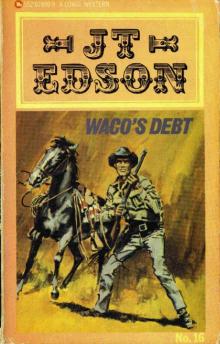 Wacos Debt
Wacos Debt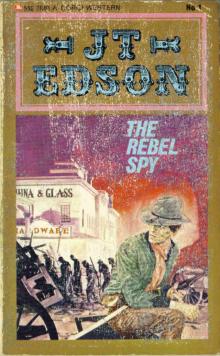 The Rebel Spy
The Rebel Spy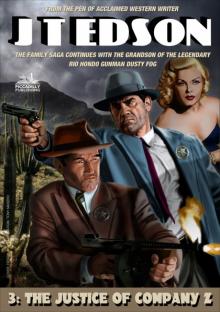 Cap Fog 3
Cap Fog 3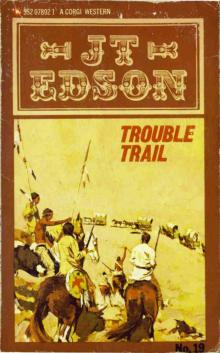 Trouble Trail
Trouble Trail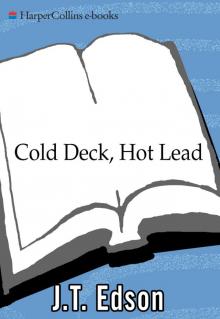 Cold Deck, Hot Lead
Cold Deck, Hot Lead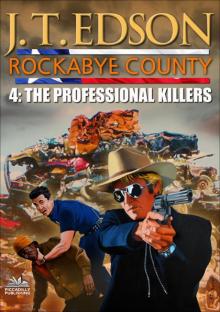 Rockabye County 4
Rockabye County 4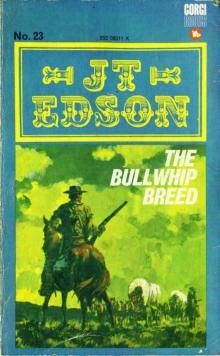 The Bullwhip Breed
The Bullwhip Breed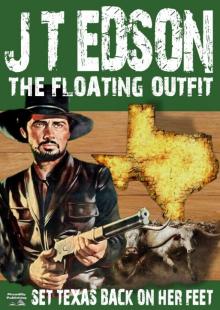 Set Texas Back On Her Feet (A Floating Outfit Western Book 6)
Set Texas Back On Her Feet (A Floating Outfit Western Book 6)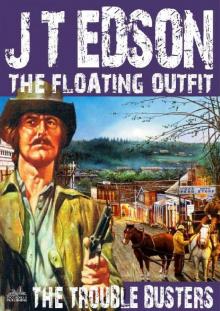 The Floating Outfit 25: The Trouble Busters (A Floating Outfit Western)
The Floating Outfit 25: The Trouble Busters (A Floating Outfit Western)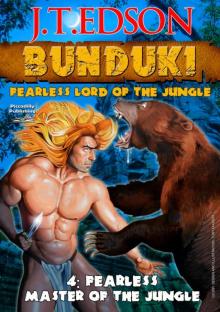 Fearless Master of the Jungle (A Bunduki Jungle Adventure
Fearless Master of the Jungle (A Bunduki Jungle Adventure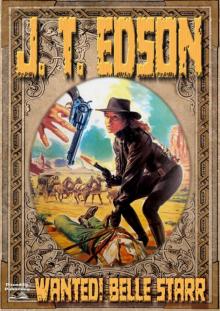 Wanted! Belle Starr!
Wanted! Belle Starr!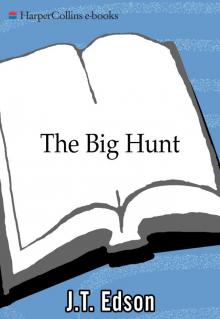 The Big Hunt
The Big Hunt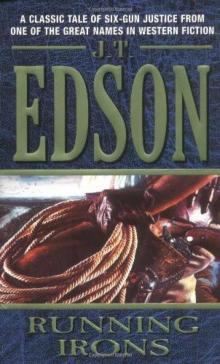 Running Irons
Running Irons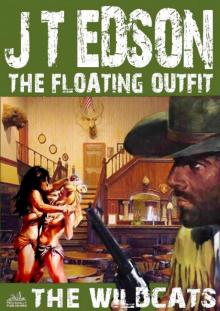 The Floating Outfit 19
The Floating Outfit 19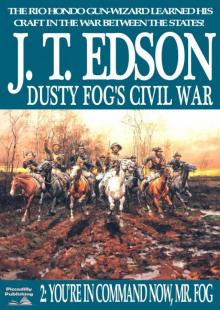 You're in Command Now, Mr Fog
You're in Command Now, Mr Fog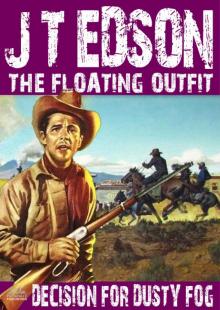 The Floating Outfit 27
The Floating Outfit 27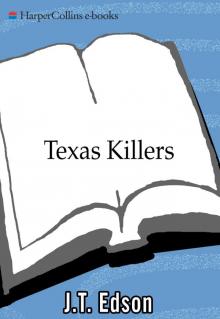 Texas Killers
Texas Killers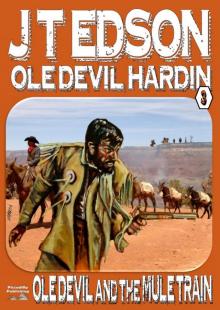 Ole Devil and the Mule Train (An Ole Devil Western Book 3)
Ole Devil and the Mule Train (An Ole Devil Western Book 3)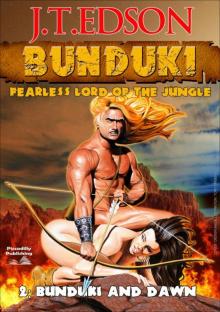 Bunduki and Dawn (A Bunduki Jungle Adventure Book 2)
Bunduki and Dawn (A Bunduki Jungle Adventure Book 2)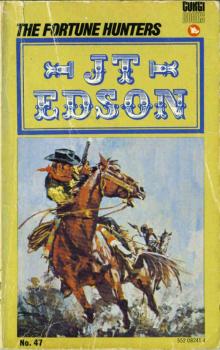 The Fortune Hunters
The Fortune Hunters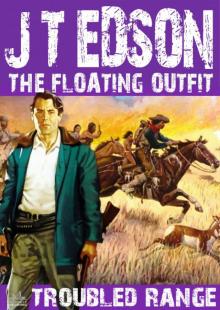 The Floating Outfit 12
The Floating Outfit 12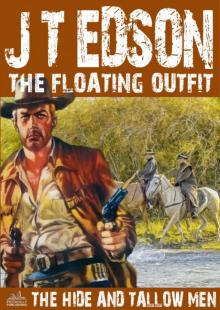 The Hide and Tallow Men (A Floating Outfit Western. Book 7)
The Hide and Tallow Men (A Floating Outfit Western. Book 7)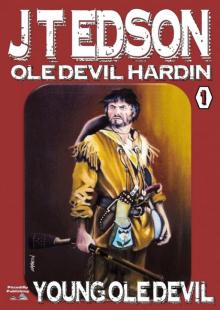 Young Ole Devil
Young Ole Devil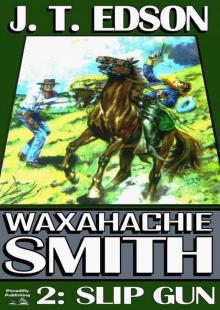 Slip Gun
Slip Gun The Drifter
The Drifter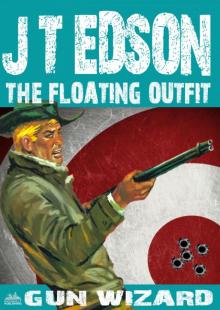 The Floating Outfit 45
The Floating Outfit 45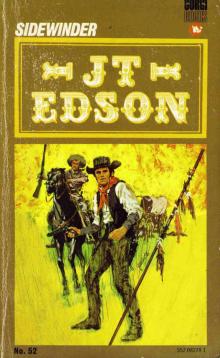 Sidewinder
Sidewinder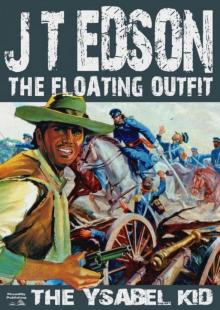 The Ysabel Kid
The Ysabel Kid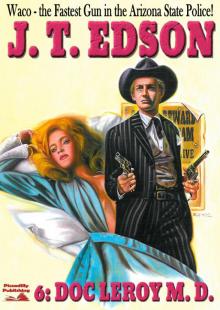 Waco 6
Waco 6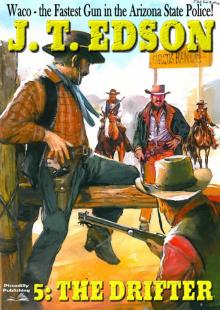 Waco 5
Waco 5 Point of Contact
Point of Contact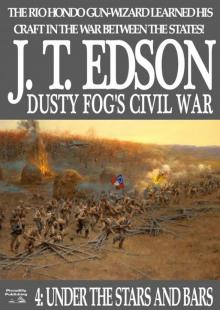 Under the Stars and Bars (A Dusty Fog Civil War Western Book 4)
Under the Stars and Bars (A Dusty Fog Civil War Western Book 4)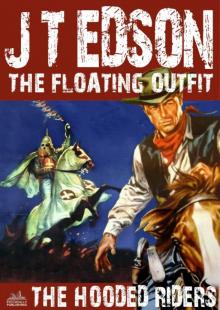 The Floating Outfit 9
The Floating Outfit 9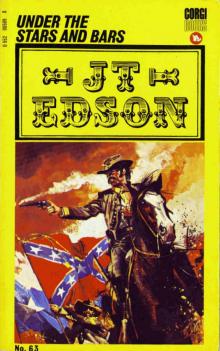 Under the Stars and Bars
Under the Stars and Bars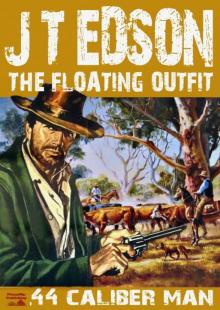 .44 Caliber Man
.44 Caliber Man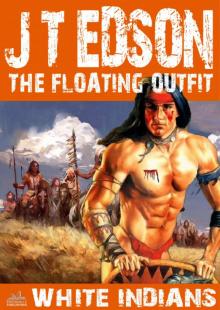 The Floating Outfit 17
The Floating Outfit 17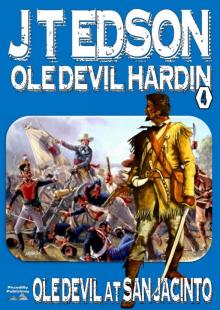 Ole Devil at San Jacinto (Old Devil Hardin Western Book 4)
Ole Devil at San Jacinto (Old Devil Hardin Western Book 4)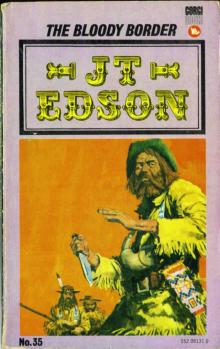 The Bloody Border
The Bloody Border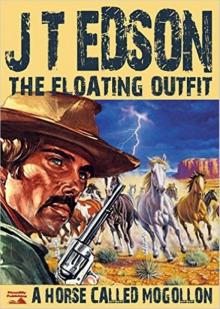 A Horse Called Mogollon (Floating Outfit Book 3)
A Horse Called Mogollon (Floating Outfit Book 3)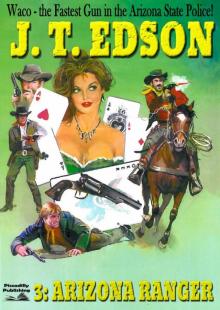 Waco 3
Waco 3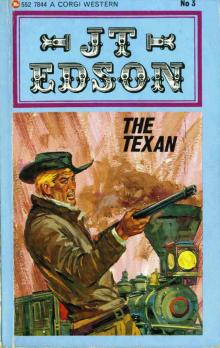 The Texan
The Texan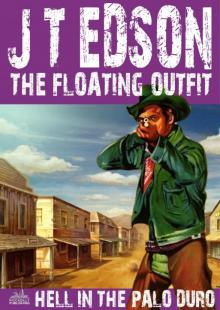 The Floating Outfit 35
The Floating Outfit 35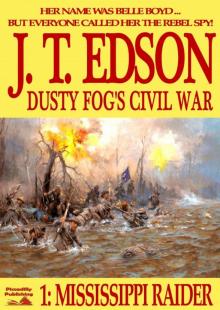 Mississippi Raider
Mississippi Raider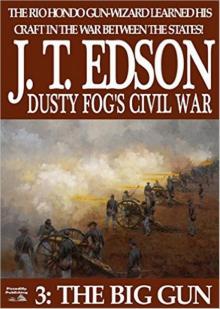 The Big Gun (Dusty Fog's Civil War Book 3)
The Big Gun (Dusty Fog's Civil War Book 3)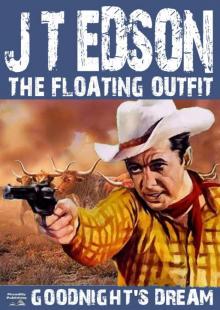 Goodnight's Dream (A Floating Outfit Western Book 4)
Goodnight's Dream (A Floating Outfit Western Book 4) Waco 4
Waco 4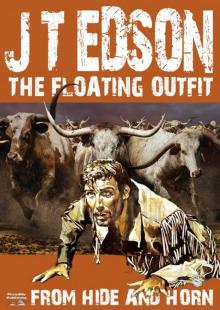 From Hide and Horn (A Floating Outfit Book Number 5)
From Hide and Horn (A Floating Outfit Book Number 5)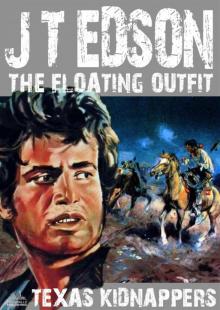 The Floating Outfit 18
The Floating Outfit 18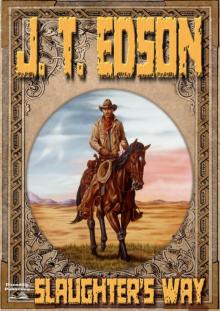 Slaughter's Way (A J.T. Edson Western)
Slaughter's Way (A J.T. Edson Western)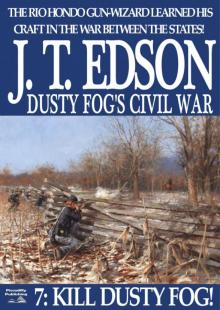 Dusty Fog's Civil War 7
Dusty Fog's Civil War 7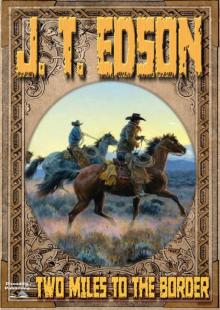 Two Miles to the Border (A J.T. Edson Western)
Two Miles to the Border (A J.T. Edson Western)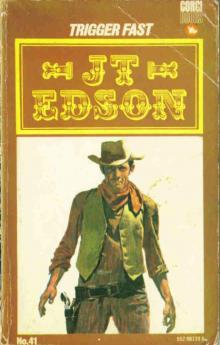 Trigger Fast
Trigger Fast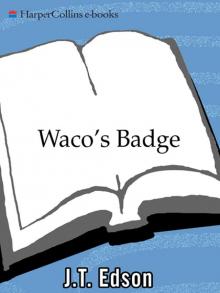 Waco's Badge
Waco's Badge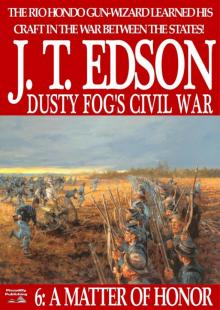 A Matter of Honor (Dusty Fog Civil War Book 6)
A Matter of Honor (Dusty Fog Civil War Book 6)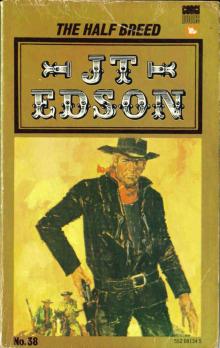 The Half Breed
The Half Breed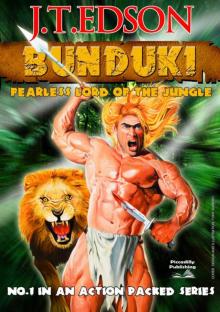 Bunduki (Bunduki Series Book One)
Bunduki (Bunduki Series Book One)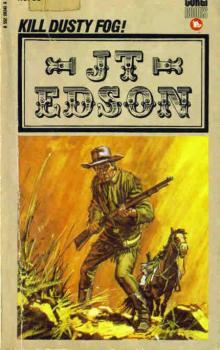 Kill Dusty Fog
Kill Dusty Fog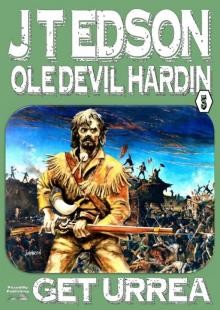 Get Urrea! (An Ole Devil Hardin Western Book 5)
Get Urrea! (An Ole Devil Hardin Western Book 5)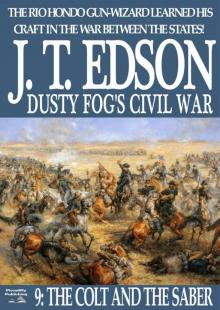 Dusty Fog's Civil War 9
Dusty Fog's Civil War 9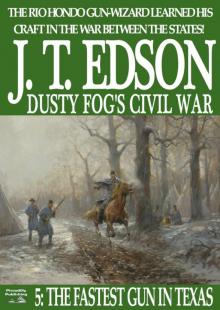 The Fastest Gun in Texas (A Dusty Fog Civil War Book 5)
The Fastest Gun in Texas (A Dusty Fog Civil War Book 5)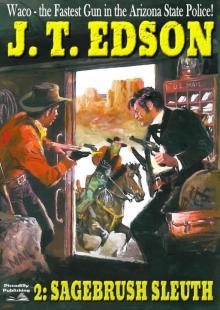 Sagebrush Sleuth (A Waco Western #2)
Sagebrush Sleuth (A Waco Western #2)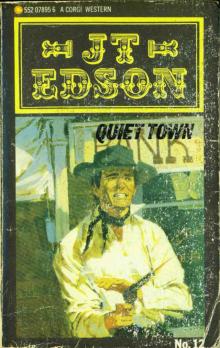 Quiet Town
Quiet Town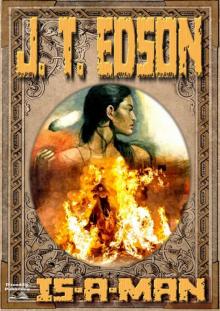 Is-A-Man (A J.T. Edson Standalone Western)
Is-A-Man (A J.T. Edson Standalone Western)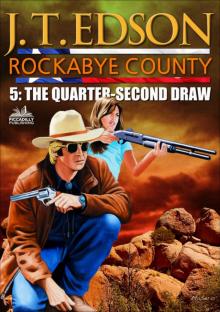 Rockabye County 5
Rockabye County 5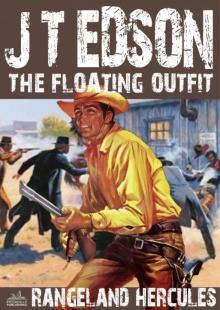 The Floating Outfit 14
The Floating Outfit 14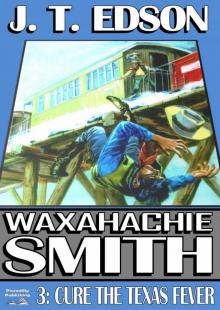 Cure the Texas Fever (A Waxahachie Smith Western--Book 3)
Cure the Texas Fever (A Waxahachie Smith Western--Book 3)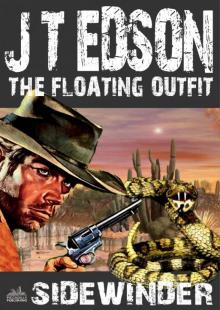 The Floating Outfit 13
The Floating Outfit 13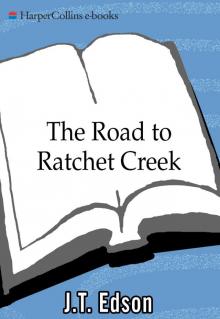 The Road to Ratchet Creek
The Road to Ratchet Creek